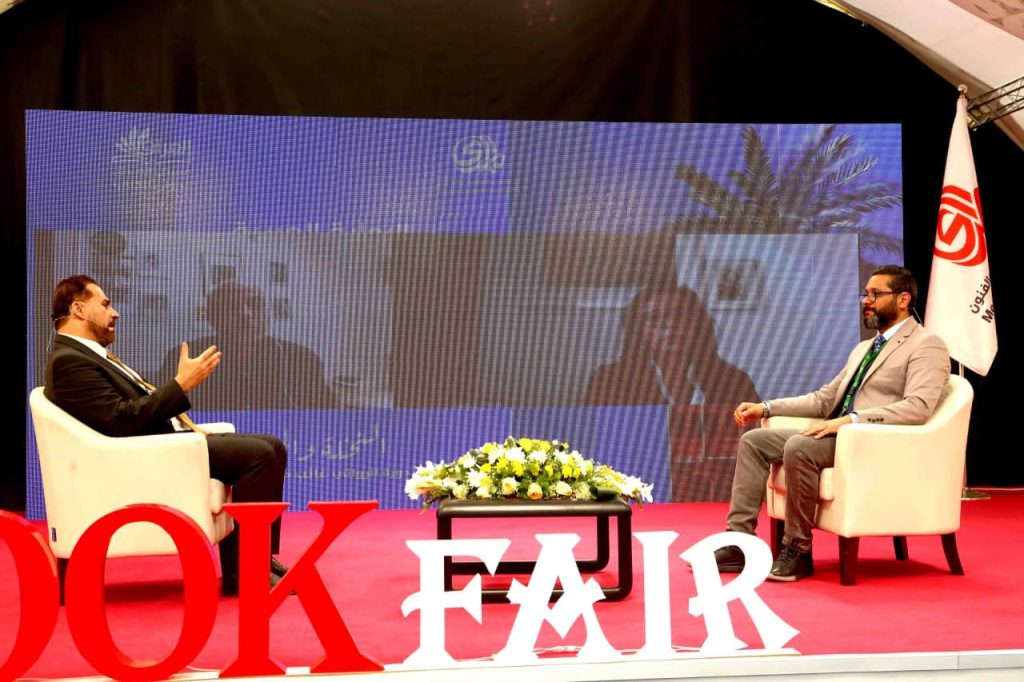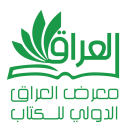
زين يوسف
تصوير : محمود رؤوف
Literary seminars continue at the Iraq International Book Fair, and this time the seminar hall hosted novelist Dona Ghaly, novelist Ali Badr and novelist Mohsen al-Ramli in a seminar entitled “The Arabic Novel and Social and Political Transformations”, which was moderated by the poet Omar Al-Saray.
At the beginning of the session, the novelist Ali Badr talked about the history of the novel and its beginnings, saying, “The novel came to express alternative history, and if we look at the official history is often related to the ruling political forces, but the novel practically specialized in alternative history, and this history is the history of societies, the movement of individuals first, and the second main point is social transformations, whether the transformations of political modernity in Western societies or inter-economic and cultural transformations in societies called non-Western societies.”
He pointed out that “the novel in the beginning appeared as a petty bourgeoisie project, “the project of employees”, and even in the Arab world the novel was written by employees, Naguib Mahfouz is an employee and absent Tohme Farman is an employee, and the transformation of the middle class, whether in Iraq or anywhere in the world, imposed that there be a new form of expression, in the past, the basic form of expression was poetry, and therefore this poetry was almost specialized in the so-called “pasteural” societies, rural societies and societies in which there is one voice, the voice of the king, the voice of God, and the voice of the ruling figures.”
On the development of the Iraqi novel and its link to political transformations, Badr said, “The new discourse arose, which is the narrative discourse, and began to develop with the development of events in Iraq and with the development of the monarchy in Iraq until we arrived in the Republic in 1958, we have a novelistic explosion at this stage on a certain amount of development of narrative methods and the novel began to take new forms with the complexity of classes and the complexity of society systems, and the emergence of this matter formed a kind of transformation within the narrative form.”
Turning to the novelist Mohsen Al-Ramli, he stressed that “the subject of this symposium is important and needs long discussions,” noting that “the subject is really important and large and is related to many fields, not only in the Arab world, but in the whole world, in fact the novel today is really the Diwan of the Arabs, but it is the Diwan of the world, the novel is originally an art that monitors human transformation in a shifting situation, and for this the characters within the novel end up not what they started with.”
He stressed that “the Arab novel in general and the Iraqi novel in particular monitored well the transformations it addressed, but did not address all the transformations because these Arab social and political transformations that took place are many, large and accelerated, and the rhythm of time differs in the sense that what was happening in ten years previously is now happening in a year or less.”
He explained that “the creator and the novel are sensitive cells monitoring society, and for this we need in general to follow up critical cultural study and extract from the works of fiction the nature of transformations so as to provide a clear vision for all, this is what happened, for example, in France, as mentioned by Professor Ali Badr, in Spain at the end of the nineteenth century there was a separation between the official discourse that depicts Spain as an empire and the street that suffers and the intellectuals united and produced a generation that founded the Spanish identity, and was a group of poets Critics and novelists have extracted from fiction the characteristics of the Spanish character because nations like people must stop from time to time and ask who I am?, who is the Iraqi? And who is an Arab? What exactly is its definition?”
The novelist Duna Ghaly somewhat disagreed with what the other two guests put forward, saying, “I find the reality of the Arab world ambiguous in one way or another, the absence of freedom and contempt for man and his exile are still shockingly and directly, the state of political instability, which in turn works to disturb the social situation is still the dominant characteristic of our societies, certainly the novel occupies a place as a creative genre today among other literary genres, and the map also expanded after rapid political and social events and transformations and included the products of minorities and marginalized groups that did not have Voice before and awareness of what surrounds the individual as he lives under these systems and is the material of these creative works in all its forms,” stressing “that what puts us in real embarrassment is that we emerge like abnormal beings that have not captured the essence of what is going on yet, have not been able to devise solutions to save humanity, perhaps this is how man thinks, in my opinion the novel does not bear the responsibility of the world, philosophy, psychoanalysis or poetry, the novel is primarily a work of art and cannot to leave her place.”
